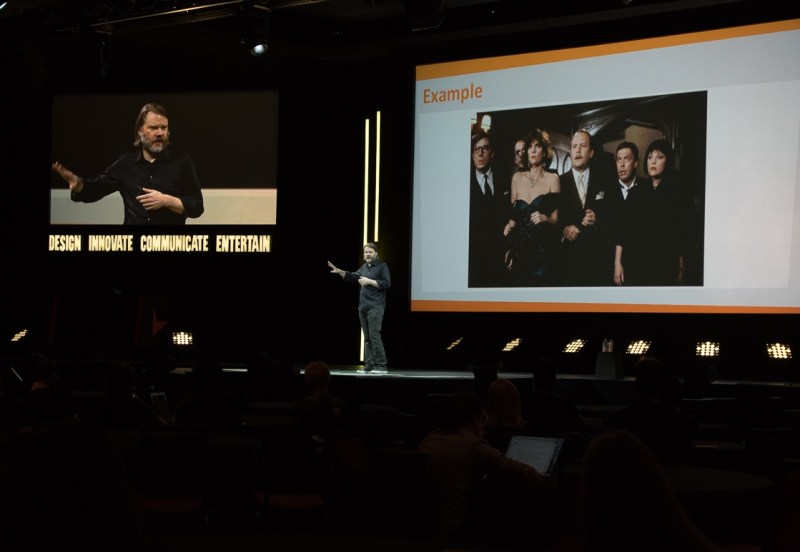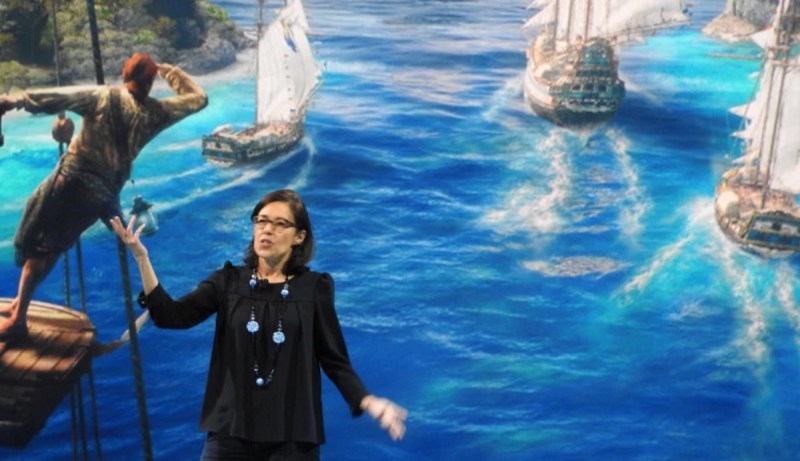GamesBeat: I believe there’s a storyteller here that’s really smart, giving me these things to do, but at some point, if I no longer believe it, it’s game over.
Faliszek: Well, hopefully you have no idea there’s AI. You don’t care about that. You’re just in the world having these experiences, having these challenges that are personal to you. These aren’t stories that are big and pre-written. But we want it to feel like your story in that you’re achieving things. You’re changing the world you’re playing. You’re having these experiences and these stories you can tell your friends about.
Some of this comes from when we were working on Left 4 Dead. We wanted to give people the place that — the game lets you breathe when it comes to stories. It’s not, “Hey, I rescued Zoe.” It’s, “Hey, I rescued Dean.” How do you tell those stories? How do you have those experiences?
GamesBeat: Are there some other key inspirations here?
Faliszek: One of the underlying things is just multiplayer games in general, where you have this emergent narrative happening. In my talk I use the example of PUBG. I have a slide where I got a chicken dinner, and I didn’t kill anybody. “The Pacifist Achievement.” I have this story I could tell you about how this happened, this really strange thing. But you have a limited set of verbs there, because that game has a limited set of verbs. Not saying the game’s bad, because what they go after they nail. But you have all these places you can tell those stories there. What if we took that and, using NPCs and expanding the verb set, told stories that are like that, but richer and more complex?
GamesBeat: How does that pacifist thing work?
Faliszek: The final circle encompassed one of the big apartment buildings. There were 12 or 13 people. I was the only one outside. Everyone else was inside. These giant gunfights broke out in the final 90 seconds, and as the circle moved to the courtyard out front, I was out front. I saw the guy running down, but he got injured and died before he got to me. [laughs]
I love that game because I can try to play it in strange ways. I once tried to get into the final 10 with — I think I had eight gas cans and nothing else. I was naked, backpack, and gas cans. I wanted some guy to find my body and say, “What strategy is he using here? He got in the final 10. He most have been doing something right. What was he doing with the gas cans?” Just bewilder that poor guy who’s left with that knowledge.

Above: Chet Faliszek at the DICE Summit in Las Vegas.
GamesBeat: What else are you thinking about as far as things like genre, or when you want to finish this?
Faliszek: We’re not talking about dates yet. It’s an action game, but it’s not the frenetic action of a Left 4 Dead. It’s more strategic in its pacing. That’s one thing about agency. You have to allow people to not just react, but choose how to act and how to approach things.
Right now we’re building it in a very iterative way. We know what we’re shooting for, what we’re trying to get, but there’s not a big design document to get there. We’re taking steps. We put in pieces, test them, see what works, and keep iterating our way there. As people may know about Valve, that doesn’t help with timelines and schedules, but hopefully it does lead to a quality game at the end.
GamesBeat: Lidwine Sauer, the Ubisoft researcher, had an interesting bird’s-eye view of games in her talk. She talked about how all these simultaneous revolutions are happening, and you have to believe they’re going to affect games somehow. We don’t know exactly what will happen, but if you only looked at games, you could miss these things that are happening that could help you. Moore’s Law is advancing. AI, blockchain, all these things have to cause innovations in games somehow. If you don’t pay attention to these things around the edge of the industry, you’re going to miss out. That seems like one of the things you’ve done.
Faliszek: She and I talked a little bit this morning. It’s definitely about looking and saying, “This isn’t ready today, but let’s make a bet.” When I originally went to Henrique Olifiers and Imre Jele I said, “I want to do something that could fail.” Something where we’ll close our eyes on some parts of it and believe it will come together. That’s one of the interesting parts of this. They were willing to take that risk.
I agree with her on that, though. There’s so much going on. The great thing is, the writer in me — I listen to podcasts about a lot of technology and AI stuff, a lot of stuff that’s over my head. But every so often they have these little stories that make me think, “Oh my God, that’s it. That’s the thing. That’s not the application we’re thinking about, but that’s totally what we want to go and do.”
The good thing is, for the most part a lot of the AI stuff now — I’ve reached out and talked with some people. We have researchers on our team. People are being pretty open, pretty sharing about it. It’s been interesting.

Above: Lidwine Sauer at the Dice Summit.
GamesBeat: It sounds like you can do something original if you start going down these paths of where technology is going to be.
Faliszek: I’m always hesitant to say “original” or “new,” because someone will rightly point out that this game in 1987 did whatever it is. “Okay, they were on to something.”
The real thing that I think we’re chasing, though — in my head, movies have a way they tell story. They’re good at passage of time. You go from weakling to tough guy in 30 seconds of the film, but it’s two years of life. In books you have an omniscient character. It knows everything. In plays you have a magic moment. In musicals you have this blending of everything coming together where the emotions come out.
In games, I’ve often looked at it and thought that the multiplayer side is what makes them special. It’s that community thing. No other form of entertainment has it in that same way. But there’s also this interaction and agency part. We’ve always been limited in the ways we can do that. Other people have tried things like this, but you can see the wall they hit when you have to hand-craft everything. Trying to free us from that and go after that, that’s what we’re going after. That, in a way, may be the real story feel of games.
You see it in snippets now. You see it in the freedom some games give you in how you approach things. Far Cry, when you’re going after those bases and choosing what to do and how to approach it, as a player those are some of my favorite experiences.

Above: AI
GamesBeat: Is there some sort of wrong interpretation people could have about this? That you’re trying to show AI will write a better game story than a human could?
Faliszek: There’s some of that. I mentioned that in my talk. There’s the joke about how AI could write Emily Dickinson. No, it can’t. The example I use is that if you gave AI a bottle of booze, it couldn’t write the collected works of Charles Bukowski. It wouldn’t have the inspiration. But if you gave it all those works, it could ape them.
In some game writing — I use the example of how, in Left 4 Dead, we always wanted the characters talking. When they weren’t talking, you would wonder, “What happened? Did I miss something, what’s going on?” In Left 4 Dead they say “Reloading” all the time. That works because you see and hear the right voice, so it’s fine, and it kind of washes over you. We made a rule where we didn’t want clever lines when it came to combat barks, because they would stick out. Even if you ran 10 of them, if one of them was clever, every time the clever one came around you’d be like, “Awwwwww.”
So when you don’t have to be clever, when you’re just writing informational stuff, maybe AI can do that part of it? Then we start expanding out how we think about it. We think about what narrative can be. Narrative, in this case, isn’t TWINE stories. It isn’t cutscenes. It’s information. It’s player intent being understood. It’s going back to what I said about how if you steal that faction’s supplies and they attack you, you don’t need a guy to stand up and tell you why. You understand the intent already.
A lot of storytelling in games is that intent. It’s either intent, trying to express intent, or it’s exposition, because you are not your character. If your character knows more than you, a lot of exposition has to catch you up to what your character knows. We’re trying to remove that. You know as much as your character does.
To settle the other common confusions about this project, on a meta level, is it’s not VR, and it’s not using Improbable. Those are both fine. I played a bunch of VR stuff again the other day. Because we want people to chew on the narrative side of this, we need to make some other things familiar. You can’t make the player learn everything all at once. That’s too much. I don’t want to play that, let alone make someone else play that. We need to give them familiar footing, and then the new thing they’re learning is layered on top of what we’re doing.
I don’t think we could do what we’re doing 10 years ago. I don’t think the players — there are things we can do with players now because they’re smarter, in the sense of being more sophisticated. They’ve played so many of these kinds of games that they get it now. Inside is an example of this. That whole beginning part in particular, that only works because we’ve all played so many platformers. We know the language they’re speaking to us. We don’t need to be trained. As games become more mature, as more people play them, as they become more mainstream—you can do different things as a designer now because you can assume that your audience has this richer understanding of the language to interact with what you’re doing.

